Dentures – San Antonio, TX
A Simple Way to Rebuild Your Smile

An estimate from the American College of Prosthodontists states that around 40 million Americans are missing all of their teeth. If you are among them, you should certainly take time to consider your tooth replacement options. Here at HIC Dental-Implant & Family Dentistry in San Antonio, Dr. Patel often provides dentures for patients who are looking for a simple way to rebuild their smile. Contact us today to learn more about this efficient and effective treatment.
Why Choose HIC Dental-Implant & Family Dentistry for Dentures?
- Beautiful & Natural-Looking Results
- Skilled & Detail-Oriented Dentist
- Cost-Effective Solution for Missing Teeth
Who Is a Good Candidate for Dentures?

Are you struggling with the life-altering effects of missing teeth, such as difficulty chewing and speaking? Dentures might be right for you. When you visit us for your consultation, Dr. Patel will carefully examine your mouth and recommend a treatment plan that is based on your unique circumstances. As long as your gums are in fair health and you have no other significant contraindications, you may be able to take advantage of this restorative service.
Effects of Missing Teeth

Missing teeth can be the result of various circumstances. The most common causes are tooth decay, gum disease, and injury. Gum disease is particularly dangerous because it is common among older adults and often goes untreated until it is advanced. Tooth decay can also be sneaky because it often does not cause symptoms until it is fairly serious.
Regardless of what caused your missing teeth, it is important that you replace them. Otherwise, you may have persistent difficulty with eating and speaking. You may also be embarrassed to smile and feel a sense of isolation in social situations. Additionally, your overall health could suffer due to an unbalanced diet.
What Qualifies You for Dentures?

Dentures may be right for you if:
- You are missing all or most of your teeth throughout one of your dental arches. If you are missing just one or two teeth, a different tooth replacement option may be preferrable.
- You are in fair oral health. You should be free of active gum disease, and your jawbone should be strong enough to support dentures.
- You are looking for a cost-effective treatment. Traditional dentures are popular among patients who are eager to find a budget-friendly form of tooth replacement.
Alternative Tooth Replacement Options
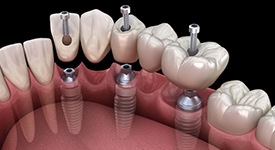
If dentures are not right for you, you may be eligible for one of the following forms of tooth replacement:
- A dental bridge. A bridge is a nonremovable prosthetic that relies on the remaining natural teeth for support. It can usually replace 1 – 3 missing teeth in a row.
- Dental implants. Dental implants are prosthetic tooth roots. They can be used to support crowns, bridges, or dentures. Due to their stability, longevity, and other benefits, they are often regarded as the gold standard for tooth replacement. However, they do require more money and a longer treatment process.
Types of Dentures

There are a few different types of dentures. During your tooth replacement consultation, Dr. Patel will make a treatment recommendation based on your level of tooth loss, your oral health, and your personal preferences. You might be eligible for partial dentures, full dentures, or implant dentures.
Partial Dentures

If you still have a few healthy natural teeth, you might be a candidate for a partial denture, which is sort of like a puzzle piece that fits in around the existing dentition. Typically, partial dentures consist of an acrylic base, acrylic teeth, and small metal or acrylic clips to help them stay in place.
Full Dentures

The purpose of a full denture is to replace either all of the upper or lower teeth. Full dentures usually have an acrylic base and acrylic or porcelain teeth. Natural suction or a bit of adhesive helps them to stay secure during eating and speaking.
Implant Dentures

Instead of relying on natural suction or adhesive to stay in place, implant dentures are anchored in the mouth via prosthetic tooth roots, which get surgically placed into the jawbone. Implant dentures are incredibly strong and are often regarded as the next best thing to natural teeth.
How Dentures Are Made

After you decide to commit to dentures, you may have some questions about the road ahead. For example, you might wonder what steps are necessary during the denture creation process. How do we work with a dental laboratory to make sure that your prosthetic fits perfectly and serves as a natural complement for your facial aesthetics? Whether you need a full or partial denture, this basic overview of how dentures are made may prove to be an interesting read:
What Are Dentures Made Of?

Dentures are composed of two parts:
- The base of dentures is the part that rests on your gums. It is usually made of gum-colored acrylic, but in some cases, resin or nylon is used. With partial dentures, the base includes small acrylic or metal clips that attach to nearby natural teeth.
- The teeth of dentures are usually made of acrylic or porcelain. Acrylic is softer, so it is often the material of choice for patients who still have some of their natural teeth. Porcelain is usually favored for full-mouth tooth replacement.
The Denture Creation Process

The denture creation process involves a number of steps:
- To get things started, our team takes detailed impressions of your mouth using a special paste and impression trays. This creates a replica of your gumline that we then send to the lab that will create your prosthetic.
- Once the lab receives your impressions, they can create a wax version of your gumline and use a device known as an articulator to place teeth into the wax gumline.
- The wax dentures get sent to us. You will come in for a fitting so we can send notes to the laboratory about any adjustments that may need to be made.
- We continue to coordinate with the dental laboratory as they work to fabricate your final restoration. Any necessary adjustments will be made to make sure that your new teeth are as comfortable and functional as possible.
Adjusting to Your New Dentures

If your new dentures are not comfortable for you right away, that is nothing to worry about. There is an adjustment period where you might experience some soreness and tenderness in your gums. Challenges with eating and speaking are also common. With time, though, your dentures should start to feel like a natural extension of your body. Just be patient and continue to practice using your prosthetic. If a few months pass and you are still struggling, give us a call. Your dentures might need another adjustment.
Benefits of Dentures

When you’re missing multiple teeth, daily tasks like eating, speaking clearly, and smiling with confidence can become a challenge. Dentures are a life-changing tooth replacement solution that is ideal for patients who are missing several, most of, or all their natural teeth.
Dentures can easily improve your quality of life by giving your smile another chance, and by providing the following benefits.
Psychological Benefits

Edentulous people (those without teeth) often struggle to accept tooth loss. Along with this comes many damaging effects on your self-esteem and social life, as well as an increased risk of feelings of sadness and depression.
If you’re insecure about tooth loss, you may be less inclined to engage in social activities, but when you restore your smile with the help of dentures, you are likely to experience an increase in confidence and self-esteem.
Dentures can greatly reduce your anxieties about appearance, speech articulation, chewing ability, and much more, all while engaging socially.
Clearer Enunciation

Missing teeth can make speaking clearly very difficult. In order to pronounce and perform words, your lips and tongue need to be positioned properly. Without the full ability to touch your tongue to your teeth, some words can be extremely difficult to say.
Dentures can help by acting as your missing teeth, thereby allowing you to enunciate more clearly while speaking. In fact, after a short adjustment period and a little bit of practice, speaking with your new dentures will become second nature!
Improves Nutrition

Many nutritious, delicious foods have earned the reputation of being tough in texture, especially certain fresh fruits and vegetables and healthy proteins. Unfortunately, when you can’t chew your food thoroughly due to tooth loss, it is common to experience painful issues like indigestion and malnutrition.
With an improved ability to chew, your new dentures will allow for a more expansive diet, full of the nutritious, delicious foods that you love.
Ultimately, your dentures can help your body receive the essential nutrients necessary for optimal overall health and wellness.
Preserves Oral Health

If you still have any remaining natural teeth, getting dentures can help prevent them from shifting to other areas of your mouth. They can also bear some of the weight of regular chewing, thereby reducing the wear and tear on your existing teeth.
Expands Opportunity

Your smile is your calling card, and one of the first things that people notice about you. When it comes to job interviews, sales, and even getting promotions, it’s vitally important to make a good first impression, and having a complete, healthy smile is a definite advantage.
Dentures Aftercare
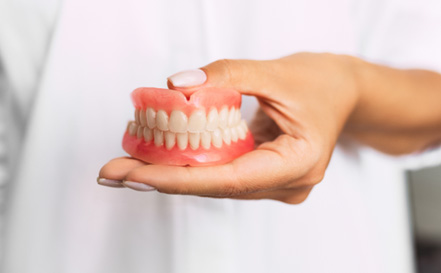
Your new dentures can help transform the appearance and function of your smile. However, even if you have few or no remaining natural teeth, it doesn’t mean you should stop visiting Dr. Patel. Be sure to attend your regular, biannual exam and cleaning appointments so he can continue to monitor any existing teeth, gum tissue, and the condition of your prosthetics. He will also continue to screen you for any abnormalities that could indicate oral cancer, as it can be very difficult to notice these changes in your mouth on your own, and early detection is often the key to making a complete recovery.
Removeable Dentures

Remove After Eating
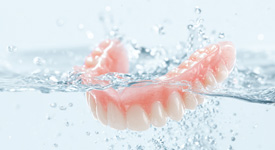
After each meal, completely remove and rinse off your dentures. Doing this will help prevent buildup of food debris and plaque.
Never use hot water to clean your dentures, as this can warp the denture material and prevent them from fitting properly.
Clean Your Restoration
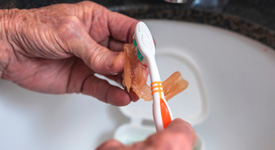
Completely remove your dentures to clean them. Using a soft-bristled toothbrush and a small amount of unscented hand soap, mild dish soap, or denture cleanser, gently brush your dentures. Never use regular toothpaste to clean them, as they aren’t made to stand up to abrasive products.
If you won’t be wearing your dentures again right away, gently place them in a container of water or denture cleansing solution so they don’t dry out and lose their shape.
Be sure to rinse them well before returning them to your mouth, as these cleansers are not meant to be ingested.
Keep Your Dentures Safe
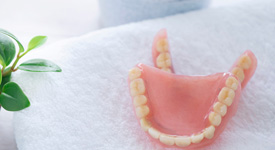
When cleaning your dentures, be sure to place a towel underneath just in case you accidentally drop them. This will lower your risk of them becoming damaged if you do. Also, be sure to store them out of the reach of small children and pets.
Remove When You Sleep
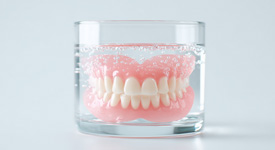
Take your dentures out each night before you go to bed. Wearing dentures restricts the circulation in your gums, which can lead to soft-tissue irritation. Sleeping with dentures on has been linked with a higher risk of pneumonia and higher levels of gum and tongue plaque.
Store your dentures in water or denture soaking solution overnight. If you allow them to dry out, they can become permanently warped or irreparably cracked.
Notice Changes

Keep a close eye out for changes in your oral health so you can address them with Dr. Patel. This includes gum sores, irritation, or signs of infection.
Should your dentures become damaged, never attempt to repair them yourself. You could accidentally make the damage worse. Instead, call Dr. Patel and we can schedule you for an emergency appointment.
If you notice your dentures shifting, clicking, or showing any other signs of improper fit, let Dr. Patel know as soon as possible, as they may need to be relined or replaced.
All-on-4 Dentures
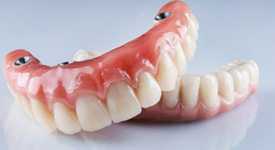
Brush your dentures twice daily using a soft-bristled manual or electric toothbrush and non-abrasive toothpaste. Be sure to avoid any toothpaste that contains baking soda or stain-removing agents.
Floss your replacement teeth once a day. Floss threaders may make it easier to floss underneath the denture. You may also want to consider investing in a water flosser to help keep your restoration and implants clean.
Sulcus brushes are 1/3rd the width of a normal toothbrush and are great for cleaning between your restoration and gums.
Be sure to rinse your mouth well with antibacterial mouthwash every day to prevent the growth of tartar.
Dentures FAQs
Should I Have All My Teeth Pulled to Get Dentures?
While extractions may be necessary to accommodate your new denture, Dr. Patel will always explore all your other options first. Whenever possible, he would rather preserve your natural teeth as they are stronger and more stable than most denture prosthetics. However, severe decay, late-stage gum disease, or extensive trauma could be a cause for the removal of multiple teeth, even whole dental arches. The important thing to remember is that at HIC Dental - Implant & Family Dentistry, your dental health comes first, and Dr. Patel will always be transparent with treatment options.
Is It Hard to Talk with Dentures?
Many patients do go through a small adjustment period when they first start wearing their dentures. On top of a slight change due to a covered palate or gums, your tongue needs time to get acclimated. How long it takes to get used to these alterations varies from patient to patient, but many patients forget they’re wearing dentures after approximately two to four weeks However, the more you practice, the quicker you should see results! For example, you can try reading books aloud, speaking slower, or talking to yourself in the mirror to get used to your dentures faster.
Why Do My Dentures Smell?
Just like natural teeth, dentures require consistent maintenance to keep them clean and smelling fresh. Food particles that accumulate in and around your prosthetic are broken down by oral bacteria. This produces sulfuric compounds that cause an unpleasant smell that can linger for a long time. To alleviate this, be sure to:
- Rinse your dentures in cool water after every meal.
- Clean every surface of your prosthetic twice a day with colorless hand soap and a soft-bristled toothbrush.
- Brush your gums, tongue, cheeks, and palate with regular toothpaste.
- Soak your prosthetic in a glass of cool water or denture cleaner overnight.
- If you have implant dentures, take care of them as you would natural teeth, brushing, flossing, and rinsing regularly.
What Can’t You Eat with Dentures?
While dentures restore your ability to eat many nutritious foods that you enjoy, they do have limitations. Sticky candies, popcorn, raw vegetables, tough meats, and other hard-to-chew foods are much more difficult to enjoy with dentures because they can stick in your prosthetic or cause it to dislodge. It’s best to cut these foods into smaller pieces, cook them differently, or avoid them altogether to avoid denture damage.
This isn’t as much of an issue with implant dentures because they are anchored to your jawbone, providing the stability necessary to bite and chew. However, even implant dentures can still be damaged by biting into hard items like popcorn kernels or ice.
